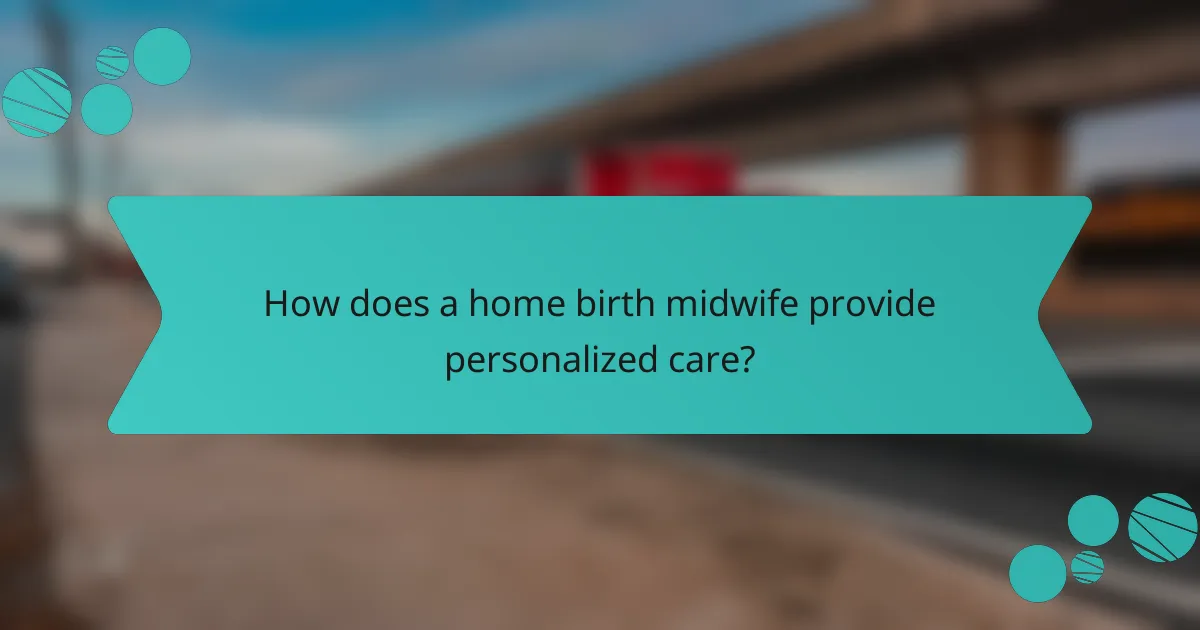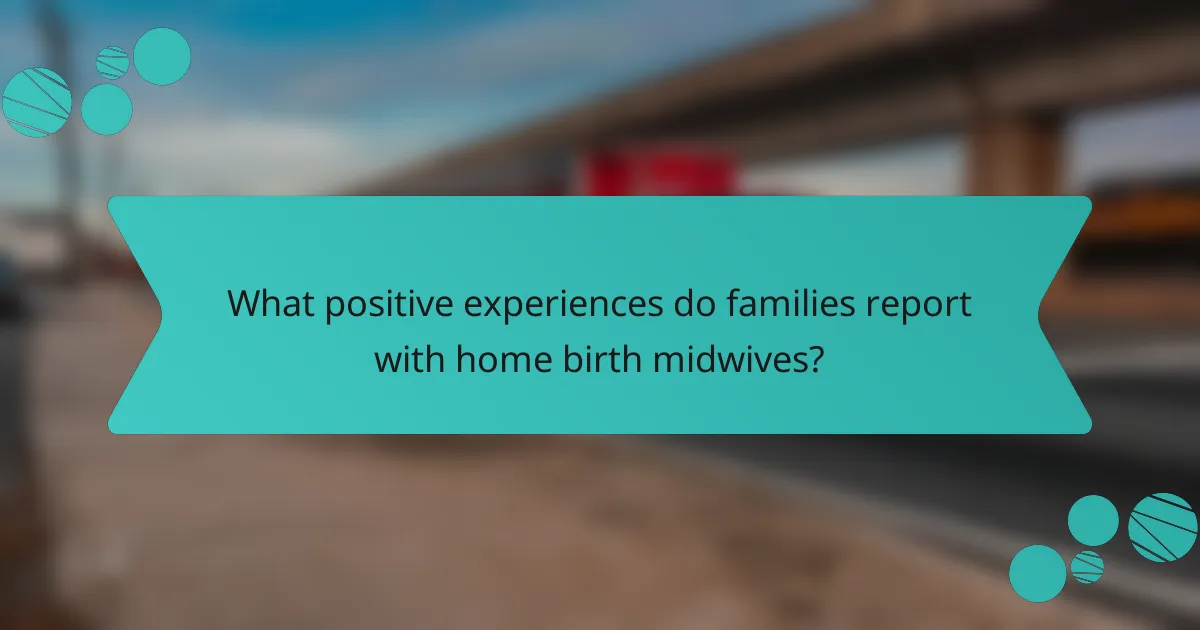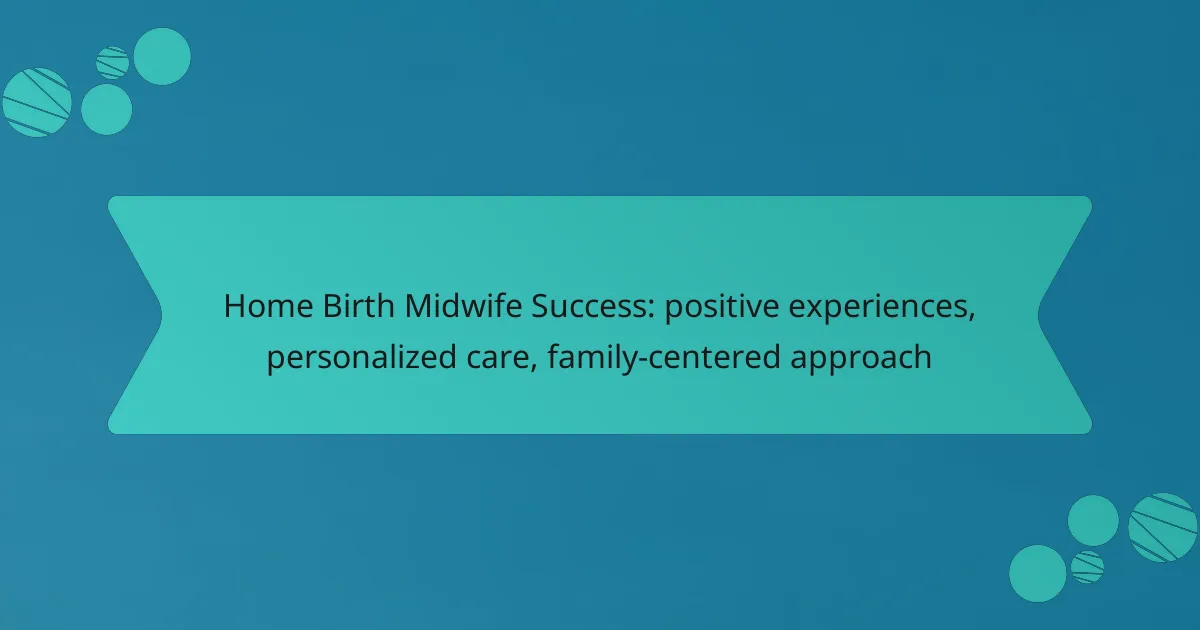Home birth midwives provide a unique and personalized approach to childbirth, focusing on the specific needs and preferences of each family. By creating a comfortable and supportive environment, they empower mothers and foster a family-centered experience that often leads to highly positive outcomes. Families frequently highlight the benefits of this tailored care, which aligns with their values and enhances their overall birthing experience.

How does a home birth midwife provide personalized care?
A home birth midwife offers personalized care by tailoring the birthing experience to the individual needs and preferences of the family. This approach emphasizes a supportive environment where the mother feels comfortable and empowered throughout the process.
Individualized birth plans
Home birth midwives collaborate with families to create individualized birth plans that reflect their values, preferences, and medical history. These plans can include choices about pain management, positions for labor, and the involvement of family members during the birth.
By discussing options and preferences in advance, families can ensure that their unique needs are respected, leading to a more satisfying birth experience. Midwives may also provide information on various birthing techniques and practices to help families make informed decisions.
Continuous support during labor
During labor, a home birth midwife provides continuous support, which is crucial for a positive birthing experience. This support includes physical assistance, emotional encouragement, and guidance through labor stages, helping to alleviate anxiety and discomfort.
Having a dedicated midwife present can enhance the laboring person’s confidence and ability to cope with contractions. Midwives often use techniques such as breathing exercises, massage, and positioning to facilitate a smoother labor process.
Postpartum care and follow-up
After the birth, home birth midwives offer postpartum care that focuses on the health and well-being of both the mother and the newborn. This care includes monitoring vital signs, assessing recovery, and providing breastfeeding support.
Follow-up visits typically occur within the first week after birth, allowing midwives to address any concerns and ensure that both mother and baby are thriving. This ongoing support helps families transition smoothly into parenthood and fosters a strong relationship with the midwife.

What are the benefits of choosing a home birth midwife in the United States?
Choosing a home birth midwife in the United States offers several advantages, including personalized care, a comfortable setting, and a family-centered approach. These benefits can lead to a more positive birth experience for mothers and their families.
Comfort of familiar environment
Giving birth at home allows mothers to be in a familiar and comfortable environment, which can significantly reduce stress and anxiety. This setting can help women feel more in control during labor, leading to a more relaxed experience.
Home birth midwives often encourage the use of personal items, such as pillows, music, or family photos, to create a soothing atmosphere. This personalization can enhance the overall comfort and emotional support during the birthing process.
Lower intervention rates
Home births attended by midwives tend to have lower intervention rates compared to hospital births. Many women who choose home birth do so to avoid unnecessary medical interventions, such as cesarean sections or epidurals, which can sometimes be more common in hospital settings.
Midwives focus on supporting natural labor and delivery, which can lead to fewer interventions. This approach aligns with the preferences of many women seeking a more holistic birthing experience.
Enhanced family involvement
A home birth allows for greater family involvement during labor and delivery. Family members can participate in the process, providing emotional support and comfort, which can strengthen family bonds.
Midwives often encourage partners and siblings to be present, fostering a supportive environment. This involvement can create lasting memories and a sense of unity as families welcome a new member together.

What positive experiences do families report with home birth midwives?
Families often report highly positive experiences with home birth midwives, emphasizing personalized care, comfort, and a family-centered approach. These midwives provide support that aligns with the family’s values and preferences, leading to a more satisfying birth experience.
Empowered birth experiences
Home birth midwives prioritize the autonomy of the birthing person, allowing them to make informed choices throughout labor and delivery. This empowerment can lead to a greater sense of control and satisfaction during the birth process. Families often appreciate the ability to create a birth plan that reflects their wishes, including preferred positions, pain management options, and the presence of loved ones.
Additionally, midwives encourage active participation from partners and family members, fostering a collaborative environment. This support can enhance the overall experience, making it more memorable and meaningful for everyone involved.
Stronger family bonds
Having a home birth can strengthen family bonds by allowing partners and siblings to be more involved in the process. The familiar environment of home can create a sense of safety and comfort, which is beneficial for both the birthing person and their family. This intimate setting often leads to shared experiences that deepen connections among family members.
Moreover, the presence of a midwife who supports family dynamics can facilitate open communication, helping families navigate the transition into parenthood together. This collaborative approach can foster a nurturing atmosphere that enhances emotional ties.
Higher satisfaction rates
Families who choose home birth midwives frequently report higher satisfaction rates compared to those who deliver in hospitals. This satisfaction stems from the personalized care, continuous support, and the ability to remain in a comfortable environment. Many families feel that their needs and preferences are prioritized, leading to a more positive overall experience.
Research indicates that when families feel supported and respected during childbirth, their overall satisfaction increases significantly. This trend highlights the importance of choosing a care model that aligns with personal values and preferences, ultimately contributing to a fulfilling birth experience.

What should you consider when selecting a home birth midwife?
When selecting a home birth midwife, prioritize their qualifications, experience, and compatibility with your family’s values. These factors significantly influence the quality of care you receive and the overall birth experience.
Qualifications and certifications
Ensure that your home birth midwife holds the necessary qualifications and certifications recognized in your area. In many countries, midwives should be licensed and may have certifications from organizations like the American Midwifery Certification Board or equivalent local bodies.
Ask about their educational background and any specialized training they have completed. A midwife with additional training in areas such as neonatal resuscitation or emergency procedures can provide extra reassurance during your home birth.
Experience with specific birth scenarios
Consider the midwife’s experience with various birth scenarios, including those that may be relevant to your situation, such as multiple births or previous cesarean sections. A midwife who has handled a range of scenarios can better navigate unexpected challenges.
Inquire about their overall number of births attended and their approach to complications. Understanding their protocol for emergencies can help you feel more secure in your choice.
Compatibility with family values
Your midwife should align with your family’s values and preferences regarding childbirth. Discuss your birth plan, including any specific practices or philosophies you wish to incorporate, such as natural pain management techniques or the involvement of family members during labor.
Establishing a good rapport is crucial. A midwife who respects your wishes and communicates openly can create a supportive environment, enhancing your home birth experience.

How do home birth midwives ensure safety during delivery?
Home birth midwives prioritize safety through comprehensive training, emergency preparedness, and collaboration with healthcare systems. They utilize established protocols and equipment to manage any complications that may arise during delivery.
Emergency protocols and equipment
Home birth midwives are trained to handle emergencies with specific protocols in place. They carry essential equipment such as oxygen, suction devices, and emergency medications to address potential complications swiftly.
In addition, midwives often have a clear plan for transferring a mother to a hospital if necessary, ensuring that both the mother and baby receive timely care. This plan is discussed with the family before labor begins, providing peace of mind.
Collaboration with healthcare providers
Home birth midwives maintain strong communication with local healthcare providers to ensure a seamless transition if complications arise. They often have established relationships with obstetricians and pediatricians, which facilitates quick access to specialized care when needed.
Before the birth, midwives may consult with healthcare providers to review the mother’s medical history and any potential risks. This collaborative approach enhances safety and ensures that all parties are informed and prepared.
Risk assessment and management
Midwives conduct thorough risk assessments during prenatal visits to identify any factors that may complicate a home birth. This includes evaluating the mother’s health, the baby’s position, and any previous birth experiences.
If risks are identified, midwives may recommend alternative birth settings or additional monitoring. They also educate families about potential warning signs during labor, empowering them to seek help if needed.

What are the costs associated with hiring a home birth midwife?
The costs of hiring a home birth midwife can vary significantly based on location, experience, and services offered. Generally, families can expect to pay anywhere from a few thousand to over ten thousand dollars for midwifery care, which often includes prenatal visits, labor support, and postpartum care.
Average fees in major US cities
In major US cities, the average fees for hiring a home birth midwife typically range from $3,000 to $7,000. For example, in New York City, costs may be on the higher end, while cities like Atlanta might offer lower rates. It’s essential to research local midwives to understand the specific pricing in your area.
Insurance coverage options
Insurance coverage for home birth midwives varies widely among providers and plans. Some insurance companies may cover a portion of the costs, particularly if the midwife is a certified professional and the birth is deemed medically necessary. Families should contact their insurance provider to inquire about specific coverage details and any required documentation.
Payment plans and financial assistance
Many home birth midwives offer flexible payment plans to help families manage costs. These plans may include options for monthly payments or sliding scale fees based on income. Additionally, some organizations provide financial assistance or grants for families seeking home birth services, so it’s worth exploring local resources for potential support.
